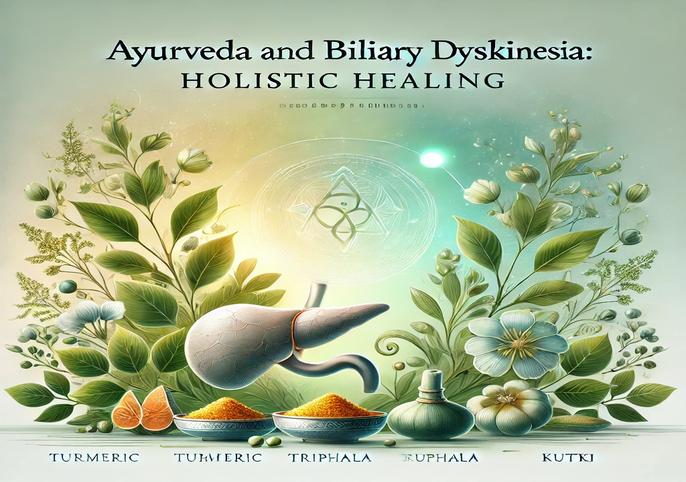Biliary dyskinesia is a functional disorder of the gallbladder and bile ducts, affecting the bile flow necessary for digestion. While conventional treatments focus on symptom management or surgical options, Ayurveda offers a holistic, natural approach to address the root cause of this condition. This article explores the connection between Ayurveda and biliary dyskinesia, highlighting its remedies, benefits, and practical lifestyle adjustments.
What is Biliary Dyskinesia?
Biliary dyskinesia occurs when the gallbladder or the sphincter of Oddi does not function properly, leading to impaired bile flow. Bile is essential for breaking down fats and aiding digestion. When bile flow is disrupted, it can result in symptoms such as:
- Pain or discomfort in the upper abdomen.
- Nausea and vomiting.
- Bloating or a feeling of fullness after eating.
- Indigestion, especially after fatty meals.
This condition can be triggered by factors such as poor diet, stress, or underlying digestive disorders. Conventional treatments often include medications to manage symptoms or surgical removal of the gallbladder. However, these approaches may not address the root cause, leading many to seek alternative therapies like Ayurveda.
The Ayurvedic Perspective on Biliary Dyskinesia
In Ayurveda, biliary dyskinesia is associated with an imbalance in the Pitta dosha. Pitta governs digestion, metabolism, and bile production. When aggravated, it can lead to excess heat in the body, disrupting the bile flow and digestive processes.
Ayurvedic practitioners aim to:
- Restore Pitta balance: Cooling and detoxifying remedies are used to pacify excess Pitta.
- Strengthen the liver and gallbladder: Herbs and dietary adjustments improve organ function.
- Enhance overall digestive health: Holistic treatments promote optimal digestion and prevent recurrence.
Ayurvedic Remedies for Biliary Dyskinesia
1. Herbal Remedies
Ayurveda uses a variety of herbs to support the liver and gallbladder, improving bile production and flow. Key herbs include:
- Kutki (Picrorhiza kurroa): Known for its hepatoprotective properties, Kutki helps detoxify the liver and promotes healthy bile secretion.
- Turmeric (Curcuma longa): With its anti-inflammatory and antioxidant properties, turmeric reduces inflammation in the gallbladder and supports smooth bile flow.
- Triphala: A blend of three fruits (Haritaki, Bibhitaki, and Amalaki), Triphala aids digestion, detoxifies the liver, and prevents bile stagnation.
- Guduchi (Tinospora cordifolia): Renowned for its cooling properties, Guduchi balances Pitta and improves liver function.
These herbs are often consumed as powders, teas, or capsules under the guidance of an Ayurvedic practitioner.
2. Dietary Adjustments
Diet plays a crucial role in managing biliary dyskinesia. Ayurveda recommends a Pitta-pacifying diet, which includes:
- Cooling foods: Cucumbers, coconut water, and melons.
- Leafy greens: Spinach, kale, and lettuce are light and easy to digest.
- Whole grains: Brown rice, quinoa, and barley promote digestion.
- Herbal teas: Chamomile, mint, and fennel teas soothe the digestive system.
At the same time, certain foods should be avoided:
- Spicy, oily, and fried foods: These can aggravate Pitta and worsen symptoms.
- Alcohol and caffeine: Both are heating and can disrupt bile production.
- Dairy products: Particularly cheese, as it can be heavy and difficult to digest.
3. Lifestyle Modifications
Ayurveda emphasizes the importance of daily habits in maintaining health. For biliary dyskinesia, the following lifestyle changes are recommended:
- Yoga for digestion: Poses like Bhujangasana (Cobra Pose), Dhanurasana (Bow Pose), and Marjariasana (Cat-Cow Pose) stimulate bile flow and enhance digestion.
- Mindfulness and stress management: Practices like meditation and pranayama (breathwork) help reduce stress, which is a common trigger for Pitta imbalance.
- Regular meal timings: Eating at consistent times daily improves digestion and bile secretion.
Benefits of Ayurveda for Biliary Dyskinesia

Ayurvedic treatments are designed to provide a comprehensive solution that addresses the underlying issues, ensuring long-term health benefits.
Expert Insights on Ayurveda and Biliary Dyskinesia
Dr. Amrita Patel, an Ayurvedic practitioner, explains:
“Biliary dyskinesia often results from a combination of dietary, lifestyle, and emotional factors. Ayurveda’s holistic approach addresses all these dimensions, ensuring long-term relief.”
A 2022 study published in the Journal of Complementary Medicine demonstrated that Ayurvedic herbs like Kutki and Turmeric significantly improved bile flow and reduced symptoms in patients with gallbladder dysfunction.
Real User Reviews
- Arjun K. (5/5)
“I suffered from gallbladder issues for years. Ayurvedic treatments helped me avoid surgery and improved my digestion greatly.” - Priya R. (4.5/5)
“After incorporating Triphala and dietary changes, my symptoms reduced significantly. Ayurveda truly works holistically.” - Meera J. (4/5)
“Yoga and mindfulness helped me manage stress and digestive issues. My gallbladder pain is now minimal.” - Rohan S. (4.8/5)
“The Pitta-pacifying diet suggested by my Ayurvedic doctor was life-changing. Highly recommend exploring Ayurveda for digestive problems.” - Anjali P. (5/5)
“Ayurveda gave me a second chance at health. The natural remedies worked wonders without side effects.”
Ayurvedic Dietary Recommendations for Biliary Dyskinesia

Proper dietary adjustments are foundational in Ayurvedic treatment for biliary dyskinesia, as they help balance Pitta and promote healthy bile flow.
FAQs
1. What is biliary dyskinesia in Ayurveda?
It is viewed as a Pitta imbalance affecting bile flow and digestion.
2. How does Ayurveda treat biliary dyskinesia?
Through herbs, diet, yoga, and lifestyle adjustments to balance Pitta and improve digestion.
3. Can Ayurveda prevent gallbladder surgery?
In many cases, Ayurvedic treatments can manage symptoms and avoid invasive procedures.
4. Are Ayurvedic treatments safe?
Yes, when guided by a qualified practitioner, they are natural and safe.
5. How long does it take to see results?
Results vary but are often noticeable within a few weeks of consistent treatment.
6. What lifestyle changes are recommended?
Yoga, mindfulness, and stress management are key lifestyle adjustments in Ayurveda.
Conclusion
Ayurveda offers a comprehensive and natural approach to managing biliary dyskinesia. By balancing Pitta, using herbal remedies, and making dietary and lifestyle changes, individuals can achieve sustainable relief without invasive procedures. With its focus on holistic well-being, Ayurveda remains a trusted alternative for those seeking effective solutions for digestive health.

